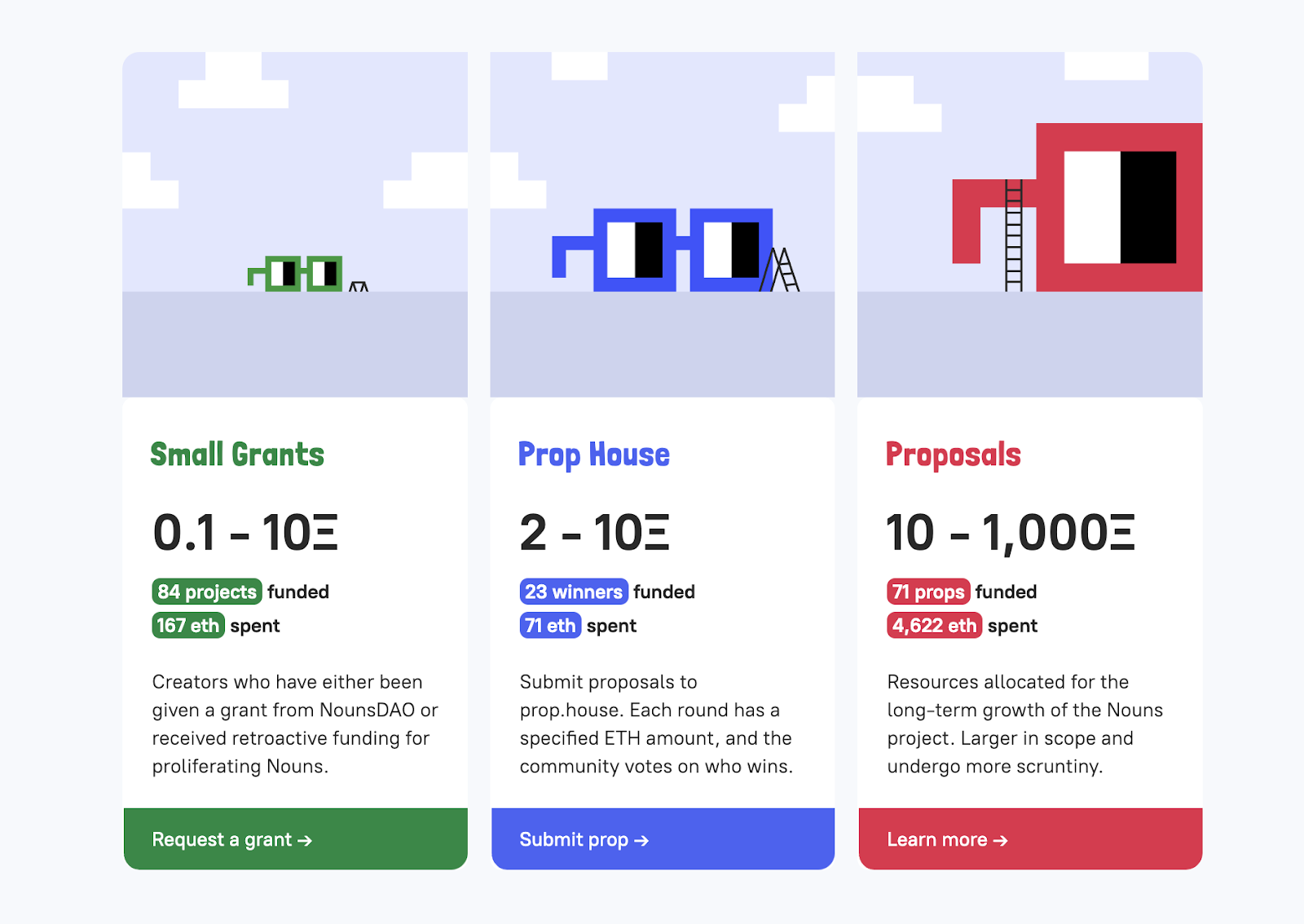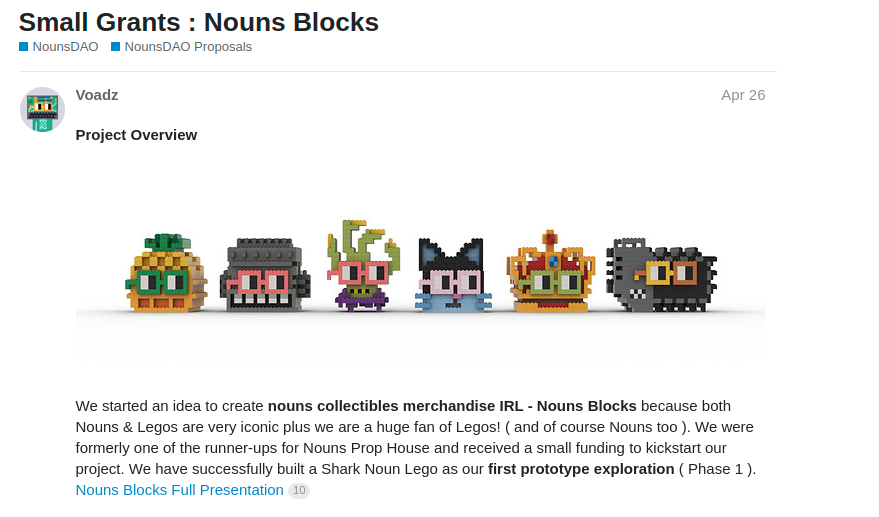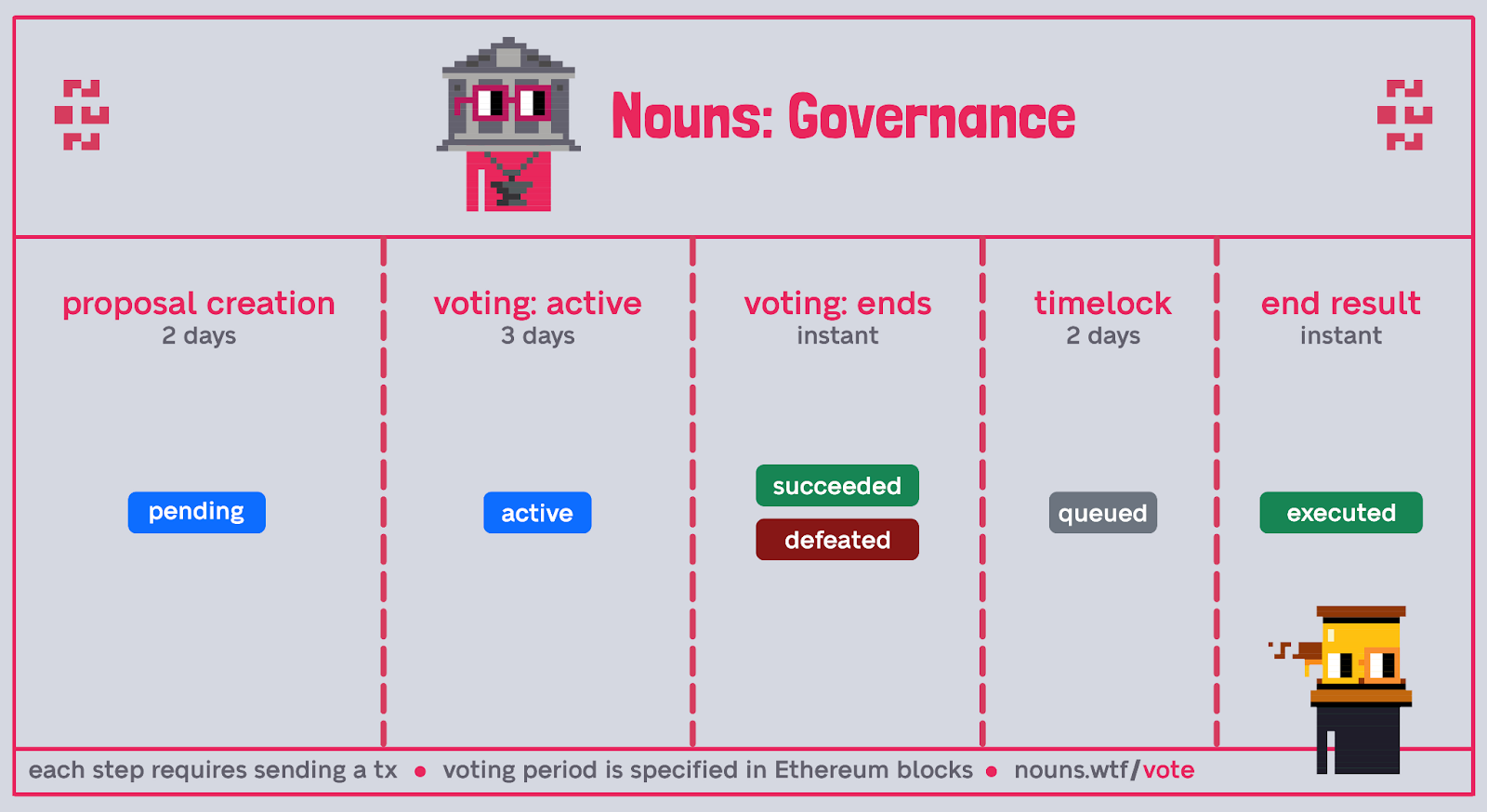Written by Sov with help from Zareef Anam
TLDR: Nouns has allocated 14,835 ETH since inception across 292 proposals via on-chain governance, Prop House, and small grants. 61% of these proposals have been completed, 37% of them are in progress, and 2% were incomplete*. While the ROI of specific allocations is difficult to measure, Nouns’ bid price, number of unique bidders, and treasury growth has held up over the past year.
Number of proposals and ETH allocated by category:

Completion rates of proposals by category:

*Incomplete includes abandoned/canceled/uncertain projects
Introduction
The Nouns community continues to fascinate us at Llama. We have published a couple of pieces focused on their unique model including Extending Nouns Through Invisible Traits by Austin Green and Designing a Nounish DAO: Analysis of Auction Frequency by gumfather. We will now dive into how effectively funds are allocated.
To date, ETH 26,695 has been amassed in their treasury (as of August 4, 2022) that are being allocated to community projects and special initiatives through three separate allocation mechanisms: small grants, Prop House, and on-chain governance proposals. We will review the efficacy of this segmented grant structure by answering the following questions across their allocation programs:
- How do Nouns’ funding mechanisms work?
- How effective has Nouns' allocation structure been in facilitating project completion?
- How can Nouns improve this structure as it continues to grow?
How is Nouns funding structured?
The primary source of funds for Nouns DAO are the auctions that take place every 24 hours. The Nouns treasury receives 100% of the proceeds from these auctions (denominated in ETH). Governance of the DAO is based on the Compound Governance model and is the main governing body of the greater Nouns ecosystem. Each Noun is an irrevocable member of the Nouns DAO and entitled to one vote in all matters of DAO governance. We will dive more into the topic of Nouns governance in future reports so, for now, let’s stay focused on the topic at hand: how grants funds are distributed.
To allocate these funds, Nouns DAO has elected to manage allocation governance through three different programs: Small Grants, Prop House and Proposals. Each grant program is aimed at allocating funds for projects of a certain size (denominated in ETH) and tackle a specific set of DAO requirements.
As someone who has spent a fair amount of time researching grants and incentives programs across Web3, the different funding bands were an interesting approach and gave some segmentation in terms of types of projects and overall level of governance needed for review and approval.

As someone who has spent a fair amount of time researching grants and incentives programs across Web3, the different funding bands were an interesting approach and gave some segmentation in terms of types of projects and overall level of governance needed for review and approval.
How effective are each of these programs in facilitating project completion?
Small Grants
The Small Grants Committee was created through Nouns Proposal 13. The Committee controls a flexible pool of capital for smaller projects, provides retroactive funding for completed projects, and funds projects where the ask is too small for an official proposal. These grants are anywhere from 0.1-10 ETH. The capital used to fund these proposals is controlled by a funding committee consisting of four Nouns and the Nouns DAO itself (who is mostly there as a backup and symbolic owner). Disbursement of funds requires two of the members to sign a multisig transaction.
The program was originally provided 20 ETH as a pilot and immediately used some of those funds to retroactively reward a few of the community members to the tune of 2.75 ETH. Over time Nouns has passed more proposals (85, 43 and 31) to provide additional funds to the Small Grants Committee. These proposals added 50 ETH in January, 100 ETH in March, and 200 ETH in June (all in 2022).
The process to request funding for small grants is straightforward. All one needs to do is open a post on the Nouns Discourse forum with the prefix “Small Grants” and include some basic information including a project overview, how it will grow Nouns (or how it has already) and how much funding is needed (or retroactively owed).

Small grants example
Nouns Small Grants (like all Nouns grants) are relatively transparent with the projects and the amounts disbursed available both on this Notion page along with the the small grants funding page on Nouns Center.
The total number of grants that have been completed at time of writing is 105 proposals or ~95% with ~226 ETH disbursed from the treasury. There are currently 5 active projects with ~22 ETH in funding, all of which are on schedule. The Small Grants team does a good job of keeping projects on task and completing them based on the timelines agreed upon in each of the proposals.
The projects are tracked across a few different categories including Art, Charity, Community, Marketing, Operational, Physical, Staking and Tech. Some of the categories do overlap (meaning some might be called both Operational and Tech, for instance) so it is a bit difficult to give exact totals related to each category. Overall, Art and Community are the most active with a combined total of 74 (again, some of these overlap) while others like Physical, Marketing and Tech accounting for lower single and double digit totals.
Both Charity and Staking had no projects listed; that may be an area for Nouns to consider funding or focusing on.
Prop House
Prop House is an interesting model that looks to have creators submit their ideas to win auctions ranging from 2-10 ETH. In some ways, this functions a bit like Gitcoin Grants, where funding rounds are launched and anyone can create a proposal for community members to vote on and express their support. Where this differs a bit from Gitcoin is in that the amount for each round is predetermined versus an open bid where the amounts can change based on the number of contributions coming in.
The original auction house, known as Nouns Launchpad, was started in late March 2022 and has had seven separate rounds with anywhere from 2-5 ETH in funding allocated for each round. After the success of this model, separate community prop (short for proposal) “houses” have been created as a means to decentralize the applicant pool and boost the number of proposals that are receiving funding. This approach was formalized in proposal 62 where the concept of these independent houses was introduced. At a high level, these houses would all include different and distinct NFT communities that are focused on specific types of auctions that all serve the greater Nouns Ecosystem.
An interesting quote from the information available that sums it up quite nicely:
“If the ERC-721 standard is thought of as the social graph, Prop House may be looked at as the permissionless power source that communities gather around. Akin to reddit, I believe we will see NFT communities for every niche imaginable.”
At the time of writing, there were a total of 84 projects with 278 ETH total granted. The projects had the same categories that were present in Small Grants (Art, Charity, Community, Marketing, Operational, Physical, Staking and Tech) with a similar funding makeup; Art and Community carry the lion’s share of funded projects. There were a couple of entries for Charity totaling around 4 ETH with Staking still being at zero.
There are 84 total projects to date on Prop House, out of which 22 are completed (26%), 35 are on schedule (41%), 3 are behind schedule (4%), 3 abandoned and uncertain (4%) and 21 that currently do not list a status (25% - these are mostly Lil-Nouns projects with a few from NounPunks). Overall it seems that they have still done a good job of ensuring progression of these projects considering they are larger and more intensive than what is being proposed with the smaller grants.
On-Chain Proposals
The last area we’ll examine in terms of grants is their on-chain Proposals. This category consists of larger funding requests ranging from 10-1,000 ETH. For this category, only Noun Owners (“Nouners”) are able to request funding. If someone would like to make a request for funding without owning a Noun, they can seek sponsorship from a Nouner by posting their idea in the Discord or Discourse or by contacting groups like Nouncil or any of the numerous Nouns’ sub-DAOs to see if they may be willing to help.
In looking at the requirements for a proposal it does ramp up a bit in terms of details needed including a detailed breakdown of how the funds will be allocated and what are the success metrics in play for the project. Nouns does ask how these proposals are structured to provide both a high level overview of the task and then be very specific in follow-on sections to detail out.
Once the proposal is submitted it will undergo what is known as a “Voting Week” which is a minimum of seven days. There is a visual overview of this process is shown below:

Nouns voting process
The categories for these proposals mirror those previously mentioned with a couple of additions: Investment and a more broad category termed “Other.” A total of 123 projects at time of writing were brought to proposal, with 98 of those passed for a total of ~14,309 ETH. The projects that didn’t pass were either defeated (voted down), expired, vetoed or canceled.
As we review further, the mix of projects funded shows more diversity in terms of category spread versus previous programs. As many of the projects are spread across multiple categories it is hard to break down specifically the funding and count for each. Marketing and Community seemed to lead the way with mid double digit counts and 4,000 to upwards of 5,300 ETH respectively. This seems consistent with what the community believe is the goal of Nouns governance (as per the inaugural Nouns survey) - to ‘proliferate the meme’. Other categories such as Art saw lesser numbers in terms of overall funding versus previous categories while Charity and Staking saw increased amounts relative to previously reviewed programs.
50 of the 98 granted projects have been completed (51%) with another 38 on schedule (39%), 6 behind schedule (6%) and 4 either uncertain, canceled or abandoned (4%). Like the other programs it seems there is a relatively high success rate for the on-chain Proposals even with the added overhead of governance that is introduced.
Concluding Thoughts: Path to the Future
The allocation mechanisms at Nouns are set up to fund interesting experiments quickly, reward talented contributors, and proliferate the Nouns meme.
Proliferating the Nouns meme is a difficult goal to attribute ROI for specific projects. However, Nouns’ bid price, number of unique bidders, and treasury growth has held up over the past year. Allocations have been relatively successful in facilitating project completion. 61% of the 292 projects have been completed and 37% are in progress.
The Small Grants program has allowed 100+ grants to be completed in the past year. The program has created as little friction as possible for builders and creators to charge ahead with their ideas. When completion rates on smaller grants start to tail off (e.g., with proposals on Prop House), Nouns team appear engaged on key forums and aware of the progress on these, with support being offered to ensure progress.
With Nouns continuing to grow, it is inevitable that the size of funds requested, and complexity of on-chain proposals for which the funds are being requested, will continue to grow. Nouns community would benefit from requiring proposals to define success metrics in advance, so the efficacy of the funds distributed can be monitored with greater rigor, and the treasury can move forward with active insights. Where proposals are complex and involve a lengthy development phase, Nouns should consider introducing milestone based payment structures so that the community can be rewarded for ongoing efforts.
Stay Up to Date on Llama 🦙
Follow us on Twitter, check out our website, and subscribe to our Substack.
Artwork credit: 0xEFRA.